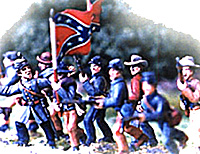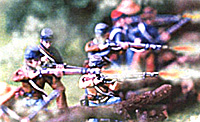 On May 15, 1864, a Federal invasion of the
Shenandoah Valley was repulsed at New Market,
Virginia, by a small rebel army commanded by
Major General John C. Breckinridge. Following its
defeat there, the Army of the Shenandoah
retreated down the Valley to the vicinity of
Strasburg to lick its wounds behind the
protective barrier of Cedar Creek.
On May 15, 1864, a Federal invasion of the
Shenandoah Valley was repulsed at New Market,
Virginia, by a small rebel army commanded by
Major General John C. Breckinridge. Following its
defeat there, the Army of the Shenandoah
retreated down the Valley to the vicinity of
Strasburg to lick its wounds behind the
protective barrier of Cedar Creek.
Breckinridge did not pursue the defeated Federals after his victory, feeling it impracticable to do so with his small force. Instead, believing the Valley safe from Federal aggression for the time being and acting on discretionary orders for Lee, he decided to march most of his little army to reinforce the hard- pressed Army of Northern Virginia, currently locked in a death struggle with the armies under the direct control of U. S. Grant.
Brigadier General John D. Imboden was left to protect the Valley with only his own brigade of cavalry, supported by a few guns and the valley reserves, a total of less than 3000 part-time and full- time soldiers. Breckinridge had miscalculated both the extent of his victory and the tenacity of his enemy.
As on every battle front during the spring campaign of 1864, defeat rarely deterred Union armies from renewed effort, and the Federal Valley Army was no exception.
Brigadier General David 'Black Dave' Hunter
 In the space of just ten days,
The Army of the Shenandoah received reinforcements
and a new commander, Brigadier General David 'Black
Dave' Hunter (at right). Immediately, Hunter went to work
dismissing inefficient or cowardly officers, and quickly
succeeded in restoring morale to recently defeated
troops. By May 25th, the Union valley army was
revitalized and at dawn on May 26th, the troops
marched from their encampments along Cedar Creek
and resumed the offensive.
In the space of just ten days,
The Army of the Shenandoah received reinforcements
and a new commander, Brigadier General David 'Black
Dave' Hunter (at right). Immediately, Hunter went to work
dismissing inefficient or cowardly officers, and quickly
succeeded in restoring morale to recently defeated
troops. By May 25th, the Union valley army was
revitalized and at dawn on May 26th, the troops
marched from their encampments along Cedar Creek
and resumed the offensive.
We can imagine the commotion that the electrifying news the renewed enemy offensive raised at Imboden's Valley District headquarters. Implicit in his excited dispatches to the government at this time was that more troops must be found quickly if the Valley was to be held, because Imboden's meager force was insufficient for the task.
However, Breckinridge's men were committed to the defense of Richmond (along with just about every other Confederate soldier in northern Virginia) and could not be returned to the valley. The only troops available were those operating in the Department of West Virginia, where Brigadier General William E. 'Grumble' Jones commanded. Jones already had his hands full trying to suppress a Federal offensive in West Virginia.
 Nevertheless, Jones scraped
together what troops he could and headed for the
valley to challenge The Army of the Shenandoah.
Remarkable, as was the resilience shown by the
Valley Federals, was the Confederate ability to
scrape together sufficient troops to fight Hunter
at all. Then to move them to the Valley in less
than ten days, is an equally astounding
achievement.
Nevertheless, Jones scraped
together what troops he could and headed for the
valley to challenge The Army of the Shenandoah.
Remarkable, as was the resilience shown by the
Valley Federals, was the Confederate ability to
scrape together sufficient troops to fight Hunter
at all. Then to move them to the Valley in less
than ten days, is an equally astounding
achievement.
Thus, on the morning of June 5th, as Hunter's army approached Piedmont, Virginia, a diverse army of 5600 Rebel soldiers, mostly veteran troops from all over West Virginia, prepared for battle north of the town under the watchful eye of their grumpy but pugnacious, and surprisingly confident general. The historical engagement was very hard fought, generating more casualties than did any battle of Stonewall Jackson's Valley Campaign of 1862. At one point, Grumble had the battle won, but he made a grave tactical error that cost him the battle.
More Peidmont: June 5, 1864
- Introduction and Historical Background
Brigadier General William E. 'Grumble' Jones
Scenario for Johnny Reb
Scenario Map and OOB (very slow: 279K)
Back to The Zouave Number 53 Table of Contents
Back to The Zouave List of Issues
Back to Master Magazine List
© Copyright 2001 The American Civil War Society
This article appears in MagWeb (Magazine Web) on the Internet World Wide Web.
Other military history articles and gaming articles are available at http://www.magweb.com